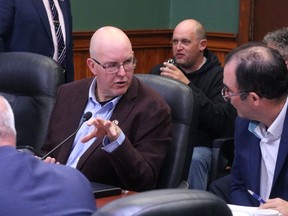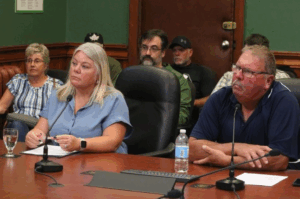Death of P.E.I. oyster industry looms without immediate support, committee hears

This article was written by Stu Neatby and originally published by The Guardian on September 29, 2025. We are sharing the full text here for reference. All rights remain with the original publisher.

Peter Warris, left, executive director of the P.E.I. Aquaculture Alliance, warned that, without immediate government support, the province could see the “death of the (oyster) industry as we know it.” Photo by Stu Neatby /The Guardian
Representatives of P.E.I.’s oyster fishery are warning that the dual threats of the MSX and dermo could spell the end of the industry unless government support programs are up and running soon.
MSX, or multinucleate sphere unknown, is a disease that can cause up to 90-95 per cent mortality in oysters. The disease was detected in P.E.I. waters in summer 2024. This summer, another disease known as dermo was detected in P.E.I. Dermo can cause mortalities of 50-75 per cent. Neither disease poses any risk to human health.
Seed sales ‘devastated’
Dire warnings were issued by one representative after another before a Sept. 25 meeting of the standing committee on natural resources and environmental sustainability.
Peter Warris, executive director of the P.E.I. Aquaculture Alliance, said the biggest mortalities have hit bays in the Ellerslie/Bidford and Enmore/Percival areas this summer.
“The oyster industry is a true Island success story and unless these individuals and businesses are supported over the next five years or so, we will see the death of the industry as we know it,” Warris said.
The areas that have been the most impacted to date – Ellerslie/Bideford and Enmore/Percival – represent only 14 per cent of the province’s active growing areas. In these areas, up to 80-90 per cent mortalities have been seen, Warris said.
Seed sales from Bideford have been “devastated,” he said, while sales in Enmore/Percival have effectively plummeted 100 per cent.
“In time, it’s likely that all oyster-producing areas will see a similar devastating impact,” Warris said.
Despite this, Warris said impacts are not evenly spread across the province. The industry as a whole is still growing, with total landed value of oysters in estimated to be $27 million in 2024.
But other negative impacts of the diseases are likely to hit in the future.
“It is probably going to get worse before it does get better,” Bob Creed, executive director of the P.E.I. Seafood Processors Association, told the committee.

Bob Creed, executive director of the P.E.I. Seafood Processors Association, warned at a recent standing committee appearance that shellfish mortalities are likely going to get worse in the province before they get better. Photo by Stu Neatby /The Guardian
‘We’ve got nothing to go back on’
Bob MacLeod, executive director of the P.E.I. Shellfish Association, said wild fishers have less access to programs than others in the oyster industry.
“There’s an urgency there because you’ve got to know where your grocery’s coming from next week. We’ve got nothing else to rely on. We’ve got nothing to go back on,” MacLeod told the committee.
Warris said there are things that can be done by federal and provincial governments to help the industry recover in the long-term.

Peter Warris, executive director of the P.E.I. Aquaculture Alliance, warns that, without immediate government support, the province could see the “death of the (oyster) industry as we know it.” Photo by Stu Neatby /The Guardian
These include the development of a broodstock program, to help develop oyster seed that is tolerant to MSX or dermo. Growers and fishers also need help establishing new hatcheries, Warris said.
MacLeod said the development of micro-hatcheries is urgently needed.
“This action needs to happen now. At our first industry workshop in August (2024), we heard loud and clear that micro-hatcheries are essential if we are to survive these deadly diseases,” MacLeod said.
“Yet here we are, more than a year later, with dermo and MSX spreading, and we are no further ahead than we were last July.”

Bob MacLeod, president of the P.E.I. Shellfish Association, said both levels of government should help establish small and larger hatcheries to help with oyster seed distribution. But immediate income supports are needed now for fishers. Photo by Stu Neatby /The Guardian
‘Immediate financial relief’
Warris called for “immediate financial relief” from provincial and federal governments for impacted growers and fishers.
Warris said his group has been advocating for aquaculture growers to have access to business risk management programs like AgriStability, a program that helps farmers after bad growing years.
He also said interest relief and loan payment suspension programs should be put into place for programs offered through Finance P.E.I. or other financial institutions. He said these supports should be made available over the long term, meaning five years or more.
“There’s a lot of growers out there that basically have not made any sales this year,” Warris said.
MacLeod pointed to gaps in the federal employment insurance program for wild fishers.
He said the insurable earnings requirements for oyster fishers should be lowered, while the number of weeks they can draw should be extended.
Unlike other workers, oyster fishermen have EI benefits determined by earnings instead of weeks worked. But if stocks of oysters are failing, a fisher’s take-home earnings drop, making it harder to qualify.
“We’re definitely frustrated and it’s time for action. Like, we can’t keep going like this, it’s too hard on the head,” MacLeod said.

Jolene Millar and Bob MacLeod, executive director and president of the P.E.I. Shellfish Association said immediate income supports are needed now for oyster fishers. Photo by Stu Neatby /The Guardian
Committee chair Robert Henderson asked the presenters whether they thought the provincial government has offered enough assistance to date.
“This industry has to be the most patient industry I’ve ever encountered,” Henderson said.
Warris said communication with government staff has been good. He also said he would have liked to see more support happen “yesterday.”
“I would really love to see that happen immediately. But we need it to be here in five years time and be able to deal with 10 times the volume of people coming to the program, looking for support,” Warris said. “So, yes, do it quickly. But yes, get it right.”
Source: The Guardian. Original article available here.
Recent News
This article was written by Elizabeth McMillan and originally published by CBC News on October 19, 2025. We are sharing…
This article was written by Jenna Banfield and originally published by CBC News on October 7, 2025 at 6:00AM ADT.…
This article was written by Melissa Heald and originally published by West Prince Graphic on October 1, 2025. We are…
This article was written by Stu Neatby and originally published by The Guardian on September 29, 2025. We are sharing…
This article was written by Marilee Devries and originally published by CBC News on September 25, 2025 at 9:27PM ADT.…
This document was originally circulated by the CFIA on August 28th, 2025. We are sharing the full text here for…
This article was written by Marilee Devries and originally published by CBC News on September 2, 2025 at 2:56PM ADT.…
This article was written by Maria Sarrouh and originally published by CTV News on August 16, 2025 at 5:00AM EDT. We…
This article was originally published by GenomeAtlantic in July, 2025. We are sharing the full text here for reference. All…
This article was written by Carolyn Ryan and originally published by CBC News on July 04, 2025 at 8:10PM ADT.…
